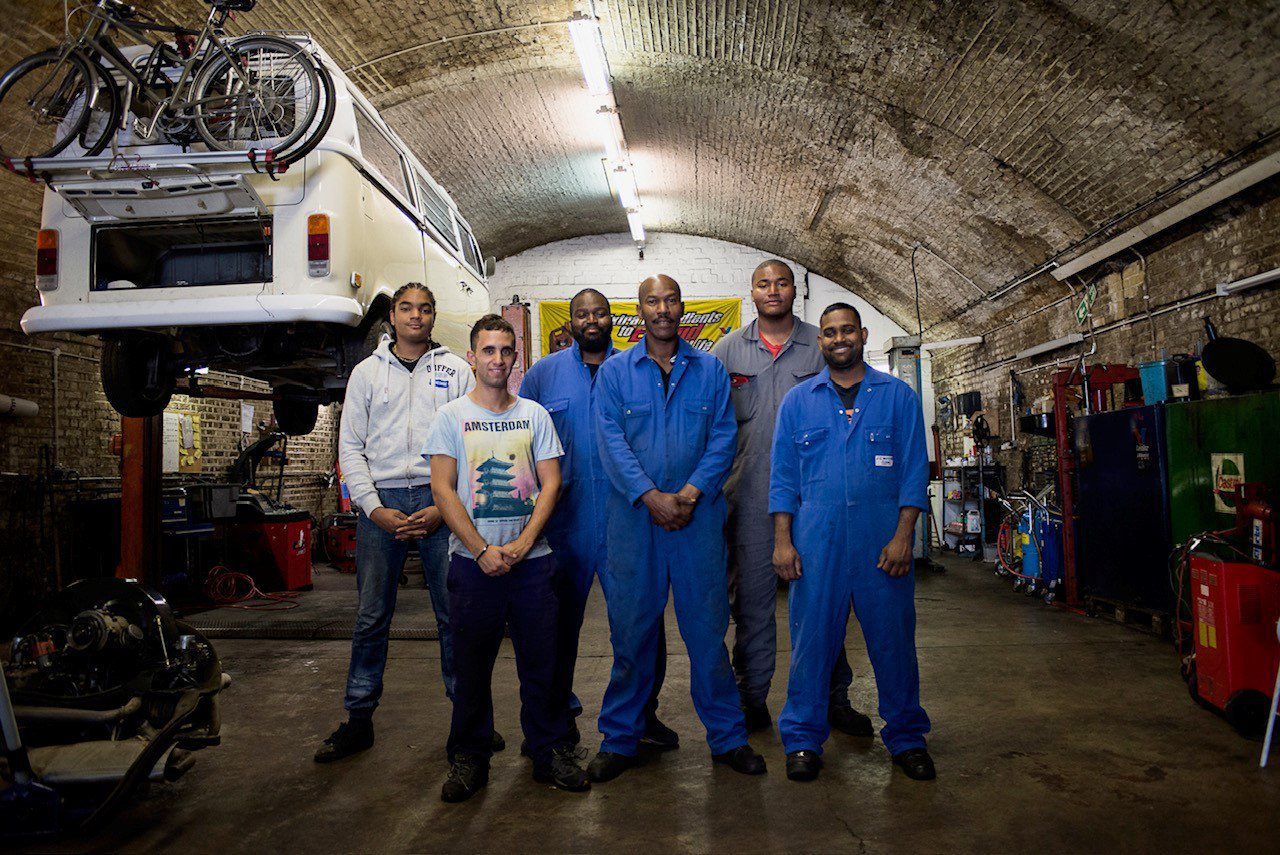When owning the land is the only answer
Small businesses provide much value to local communities, but they're being pushed out of London by extortionate rents and need an alternative
06 November 2023
Picture this: you’ve been living in the same home for decades, renting from a landlord with a broad social focus. You have built strong links in your local community and are valued for your contribution. Then your landlord decides to triple your rent. You are faced with having to find the money for this new, much higher rent or having to leave the area.
This is the situation facing Len Maloney, the owner of JC Motors, a small car repair business located in a TfL railway arch in East London. Experiences like Len’s have become more common in the past decade, as a number of systemic issues have led to the loss of reasonably-priced industrial space across London and since 2012 small business members of the East End Trades Guild have been organising to resist these trends. Since 2017 NEF have been working with the Guild and Len, making the case for a working rent: a fair rent level and lease structure that would allow SMEs to thrive and to offer vital social value for their communities.
Between 2000/01 and 2020/21 industrial floorspace in London fell by 24% through conversion to other land uses. In Inner London the loss was over 40% and in Hackney, where JC Motors is based, the loss was 62%. This has combined with growing demand to drive up rents. By 2021, rents for industrial land in London were 36% higher than their average level over the previous decade.

In this context of scarcity, private landlords have moved to extract much higher rents from small businesses across London, often with disastrous consequences. One example of this has been the Arch Company, a joint venture between the vast US investment firm Blackstone and the British property investment firm Telereal Trillium, which has sought steep rent increases from many long standing tenants across the capital since purchasing Network Rail’s portfolio in 2018. This approach is characteristic of a number of large landlords in London and demonstrates the damaging consequences of concentrated private ownership and a profit-led approach.
“The inability of policymakers to adequately respond to this issue is illustrative of our overly centralised political system and the constraints that central government uses to tie the hands of local authorities.”
The inability of policymakers to adequately respond to this issue is illustrative of our overly centralised political system and the constraints that central government uses to tie the hands of local authorities. The GLA has tried to slow the trend by requiring no net loss of industrial land as part of the 2021 London Plan, but it was overruled by the Secretary of State. Instead it was forced to include a significantly weaker policy that opens the door to further conversion of industrial land into housing. London local authorities have also been under pressure to release industrial land in the context of housing targets and deep budget cuts imposed on them by central government. While a number of London borough councils have developed promising approaches to leasing out the commercial units they still own at below-market rents to support SMEs, such as social value leases, these direct interventions remain small in scale and focused on non-industrial uses. They are also constrained by the wider lack of funding for local authorities, and could be reversed in the long-term if political leadership were to change in these councils.
This is also the context for Len’s landlord, Transport for London (TfL), the owner of 800 railway arches and one of the largest landowners in London. TfL has previously demonstrated good practice in the sector, including extending a rent holiday of three months in March 2020 to support tenants and encouraging other landlords, such as The Arch Company, to do the same, as well as refurbishing parts of its arches portfolio in a more inclusive way. But they have also faced strong pressure from central government since 2020 to cut their net spending. When fare revenues collapsed during the lockdowns, the government settlement negotiated in August 2022 guaranteed passenger revenue until March 2024, but also left an unfunded gap. In 2022, TfL made the move to spin out their property arm as a standalone entity, now known as Places for London, that generates revenue to re-invest in improving the transport network. As uncertainty still exists around the impact the end of government support will have on TfL budgets, there is concern this will have a further knock on effect on rents as Places for London are looked to as a valuable source of income to shore up the transport network.
In the face of worsening rent extraction from small firms by global capital via private landlords, and with public bodies such as the GLA, TfL and borough councils unable to adequately respond through policy, Community Land Trusts, where land and property is owned by a non-profit organisation and run democratically for community benefit, offer a potential solution. Placing industrial properties into these trusts could insulate them from rapid rent rises and provide the stability needed for small businesses, such as JC Motors, to continue to play an important role in London’s economy.
For Len, after 22 years of running a successful business that is firmly rooted in his community and facing the stress of being a pawn in these turbulent political conditions, the only solution is autonomy. His recent letter to Sadiq Khan garnered over 2,000 signatures of support over the summer as part of the #standwithlen campaign.Thanks to support from Assembly member Sem Moema and a meeting with the Deputy Mayor for Transport, Seb Dance, Len has had another reprieve. But this is not a sustainable way to run a business; Len would rather be putting his energy into supporting more young people as apprentices. Ownership of his arch through a Community Land Trust is now the only option to break the cycle of rent rises and threat of eviction, and to remove the stress that this has placed on him and on his employees. Placing his unit in this structure, with permanent affordability, would be recognition of years of campaigning for social value leases and would signal a powerful commitment from Mayor Sadiq Khan.
Please support the crowdfunder to help Len and other small business owners: https://bit.ly/TakeHackneyArches
Image: iStock
Topics Local economies






